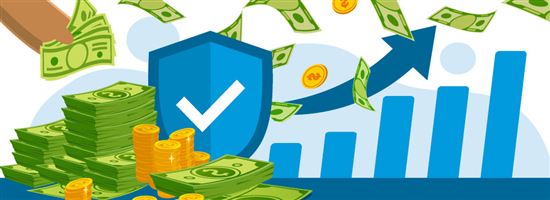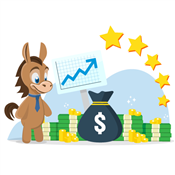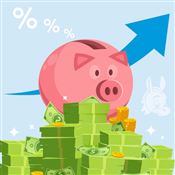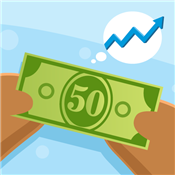Safe High Yield Investments
Ad Disclosure: This article contains references to products from our partners. We may receive compensation if you apply or shop through links in our content. This compensation may impact how and where products appear on this site. You help support CreditDonkey by using our links.
Every investor wants a high-yield investment. But which of these investments are safe? Read on to find out.
 |
There are many high-yield investment options, but not all are created equal. Some are riskier than others. If you're looking for safe investments with a potential high reward, this list is for you.
High-yield savings accounts, money market funds, and certificates of deposits are considered to be the safest investment types. With all three, you maintain the principal. The only difference between them is the interest rates they offer.
High-Yield Savings Account
High-yield savings accounts have interest rates 20-25x higher than traditional savings accounts. The national average return for a traditional savings account is 0.41%, but for a high-yield savings account, the returns can range from 2% to 5%.
They're also FDIC-insured, which means up to $250,000 is protected in case of bank failure.[1] This gives you strong returns without any risks, and your money is 100% safe.
In addition, high-yield savings accounts are liquid investments. You can easily access it without any penalty if ever you need some cash.
How to Invest:
Look for a bank that offers a high-yield savings account and simply open one.
- CIT Bank Platinum Savings:
$300 Bonus - Discover® Online Savings:
$200 Cash Bonus - Western Alliance Bank:
High Yield Savings Account - 4.25% APY - UFB Portfolio Savings:
Earn up to 4.01% APY - Mission Valley Bank:
High Yield Savings Account - 4.27% APY - DR Bank:
High-Yield Savings Account - 4.25% APY - Paprika Capital Bank:
High-Yield Savings Account - 4.22% APY - Dayspring Bank:
High-Yield Savings Account - 4.17% APY - First Community Bank:
High-Yield Savings Account - 4.15% APY - RBMAX:
High-Yield Savings Account - 3.66% APY
Money Market Funds
In general, money market funds are pools of low-risk securities grouped together to diversify risk. They have slightly higher returns than high-yield savings accounts but aren't FDIC-insured. It's important to understand that money market funds differ from money market accounts.
Money market accounts, offered by banks and financial institutions, are insured by the FDIC or NCUA. In contrast, money market funds, a type of mutual fund offered by brokerage and investment firms, are not FDIC-insured but may be covered by SIPC.
How to Invest:
Fidelity or Schwab are great platforms to check out if you're interested in this type of investment. They have the highest yields for their money market funds.
Certificates of Deposit
Certificates of deposit (CD) are offered by banks in exchange for your commitment to not touch your funds for a period of time. Banks will then give you a higher interest rate in return.
This could be a good investment if you have money that you won't need in the immediate future. The rates are higher than traditional savings accounts. CDs are also FDIC-insured, meaning your money is safe.
The time horizon for not touching your funds usually ranges from one month to 10 years. If you access the funds before your term ends, you'll likely have to pay a penalty.
How to Invest:
Many banks offer CDs along with their investment products.
- Sallie Mae Bank:
10-Month High-Yield CD - 4.35% APY - mph.bank:
60-Month Callable CD - 4.32% APY - Dayspring Bank CD Rates:
Up to 4.30% APY - Freedom Bank:
6-Month High-Yield CD - 4.30% APY - Bank Of Utah:
3-Month High-Yield CD - 4.30% APY - Western Alliance Bank:
6-Month High-Yield CD - 4.30% APY - Always.bank:
3-Month High-Yield CD - 4.25% APY - Ponce Bank:
3-Month High-Yield CD - 4.25% APY - UNCLE Credit Union:
36-Month Callable CD - 4.20% APY - SkyOne Federal Credit Union:
3-Month High-Yield CD - 4.15% APY
Treasury Inflation Protected Securities
Treasury Inflation-Protected Securities (TIPS) are government bonds that protect your money from inflation.
You basically give a loan to the government and it pays you interest on it at regular intervals. Treasury bills are paid back in under a year; treasury notes in 2,3,5,7, and 10 years; and treasury bonds in 20 or 30 years.[2]
The principal on this loan adjusts with inflation. Depending on the current rate of Consumer Price Index (CPI) inflation, the value of your principal will increase or decrease over the security's term.
The security's interest rate is fixed, but since the principal fluctuates in value, the interest payment also varies.
Unlike treasury bonds, TIPS can be sold on the secondary market and bought at three different maturities: 5, 10, and 30 years.
How to Invest:
You can buy TIPS directly from the government with a minimum purchase of $100. If you're interested in this type of investment, you can visit TreasuryDirect.
Short-Term Corporate Bonds
Corporate bonds are debt securities issued by public or private companies. These have a higher rate of return than government bonds.
However, not all corporate bonds are created equal. You need to be more cautious when choosing. The safest bonds are normally rated AAA and are reliable sources of income. However, there are also lower-rated bonds or junk bonds, which are a higher risk. It's better to avoid junk bonds.
It's best to stick to major blue-chip public companies and hold the bond until its term ends. Short-term bonds have a lower risk and corporate bonds are liquid, allowing you to buy and sell bonds each business day.
How to Invest:
You can buy corporate bonds from brokerage firms or banks.
Dividend-Paying Blue-Chip Stocks
Dividend-paying blue-chip stocks offer a high potential for long-term returns. Blue-chip stocks are financially sound companies with well-established earnings, and a dividend is a regular payment distributed by a public company to its shareholders. It's like getting a regular income from a specific stock.
However, in times of crisis, companies can and will slash their dividends. So make sure to choose companies that have a proven track record of consistently increasing their dividend on a regular basis.
How to Invest:
You can invest in dividend-paying blue-chip stocks by buying individual stocks or by buying mutual funds with blue-chip stocks. You can buy these in various brokerage firms such as Interactive Brokers.
Dividend-paying blue-chip stocks are considered relatively safe investments with the potential for higher returns. Blue-chip stocks can give high returns since these companies have well-established earnings and a proven track record of increasing their dividend payouts.
S&P 500 Index Fund/ETF
The S&P 500 is seen as a barometer of the US stock market, as it represents the 500 largest public corporations in the US. Investing in an S&P 500 index fund or exchange-traded fund (ETF) poses a lower risk than investing in individual stocks.
That's because you're spreading the risk across multiple markets. This is an ideal investment if you're a young investor who plans to hold your investment long-term.
How to Invest:
You can buy the S&P 500 index fund from most regulated brokers such as Interactive Brokers.
Fixed Annuities
An annuity is a contract usually made with an insurance company to exchange an upfront payment for a certain stream of income over a period of time. It can be structured so that you receive a payment for about 20 years or until your death.
To fund the annuity, you can make a lump sum payment or pay into it over time. This is an ideal investment for retirees who are looking for guaranteed income even though they're no longer working.
However, if you change your mind after signing the contract, you can't easily withdraw your money. Annuities are illiquid, and you can't withdraw money from an annuity without a significant penalty. So, make sure you're certain about your decision once you sign the contract.
How to Invest:
You need to choose an annuity product and an annuity provider. Make sure to choose an annuity product that meets your financial goals or needs.
The annuity provider is usually an insurance company, but you can also buy fixed annuities from brokerage firms and banks.
What Is a Safe Investment?
Safe investments typically refer to low-risk investments. They're often characterized by stability, predictability, and reliability. Common examples include high-yield savings accounts, CDs, money market funds, and TIPs.
These types of investments often involve deposits to a US bank, which is normally backed by the Federal Deposit Insurance Corporation (FDIC) for up $250,000. If the bank fails to pay you back, you'll still get your money from the FDIC.
Risk and Reward
The investment types mentioned above have varying risk and reward profiles. Generally, the higher the risk, the higher the possible reward. The lower the risk, the lower the potential reward.
Investments with higher risk include dividend-paying stocks. Although they're still considered "safe," the risk is still there. On the other hand, high-yield savings accounts have lower risk because the principal remains intact. The only risk is the potential to lose money against inflation.
Investment Projection Calculator
Want to figure out how much you can earn from these safe, high-yield investments? Check out this investment projection calculator:
Here's how to use the calculator:
- Input how much you initially invested.
- Specify if there are additional investments you've made.
- Input how many years you're giving your investment to grow.
- Specify the annual return rate of your investment.
From there, click "Calculate" and you'll get an idea of how much you can earn from the investment.
Bottom Line
If you want reasonable profits from your investments without the risk of losing your capital, any of the options mentioned above may be suitable for you. With those types of investments, there's less uncertainty and risk.
Safe investments can be a smart source of diversification in your portfolio. You keep your capital protected against market volatility.
Just remember to manage your expectations in terms of returns. Even though the options mentioned above are high-yield, safe investments, they are still low-risk investments, which means they don't have very high potential rewards.
References
- ^ FDIC. Deposit Insurance, Retrieved 06/23/2024
- ^ TreasuryDirect.gov. Understanding Pricing and Interest Rates, Retrieved 06/23/2024
Write to Del Exconde at feedback@creditdonkey.com. Follow us on Twitter and Facebook for our latest posts.
Note: This website is made possible through financial relationships with some of the products and services mentioned on this site. We may receive compensation if you shop through links in our content. You do not have to use our links, but you help support CreditDonkey if you do.
|
|
| ||||||
|
|
|











